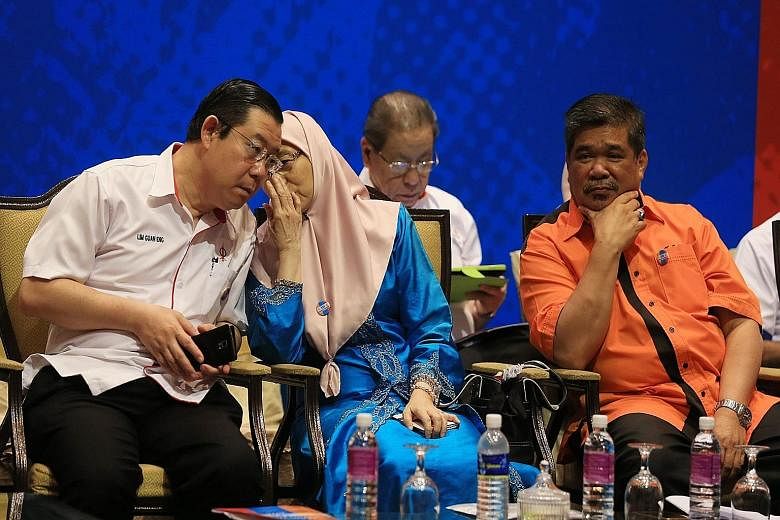Malaysia's new opposition coalition agreed to abide by a code of conduct at its first leadership meeting yesterday in a bid to bind the three parties closer together and avoid the loose "agree to disagree" framework that led to the break-up of a previous pact.
Formed three months ago, Pakatan Harapan (PH) - or Hope Alliance in Malay - replaced the Pakatan Rakyat coalition that lasted just seven years and caused the estrangement of key Islamic party, Parti Islam se-Malaysia (PAS).
The three members of PH are Parti Keadilan Rakyat (PKR), the Democratic Action Party (DAP) and Parti Amanah Negara - a PAS splinter group.
Leaders of the three parties yesterday inked the Pakatan Harapan Agreement, which outlines key internal workings on dispute settlement and ideology, though they have yet to unveil joint policies to drive their quest to unseat the long-ruling Barisan Nasional (BN) coalition.
"When BN succeeded in burying Pakatan Rakyat, they felt they were safe," said Mr Lim Guan Eng, secretary-general of the most powerful opposition party, DAP. "But Pakatan Harapan is proving that it is the end of BN that is coming."
In a four-hour long congress, PH leaders focused on the 15-page document that centres on avoiding the damaging internal feuds that shattered the previous alliance last year, despite the coalition coming progressively closer to winning federal power in the last two national elections. But the agreement skirted controversial subjects such as seat allocation for the next general election, due in 2018, and hudud, a set of Islamic criminal laws that caused intense friction between PAS and the secular DAP.
The process of seat allocation will become more complicated for the opposition as PAS, the biggest Malay opposition party, is not part of PH.
Constant attacks from both BN's lead party Umno and PAS on Malay rights and Islamic issues have damaged the already weak support DAP holds with the crucial Malay majority.
DAP adviser Lim Kit Siang had described survey results released last week by research house Darul Ehsan Institute as a "wake-up call". It showed rising anti-DAP sentiment among Malays.
The institute's November survey found that 72 per cent of Malays in Selangor - which the DAP won in the 2013 polls with PKR and PAS - saw DAP as a pro-Chinese party. And nearly two-thirds of Malays in Selangor felt the party was anti-Malay and anti-Islam.
Amanah president Mohamad Sabu said yesterday that PH "must not fall into their trap" of racial politics.
Still, while lauding PH's insistence on avoiding racial and religious rhetoric espoused by Umno-led BN, analysts believe the opposition must face the reality that Malaysia is still divided by ethnic politics.
"It is necessary to move out from ethnic politics eventually," head of policy think-tank Ideas Wan Saiful Wan Jan told The Sunday Times, "but it is a tall order to do so before the next general election, as you can be very, very sure that Umno will try its best to make sure ethnic discourse remains."
PKR secretary-general Rafizi Ramli acknowledged the "Malay insecurity", saying this was due to their relatively weaker economic status compared to Chinese Malaysians.
He said that by March, PH would begin unveiling common policies that would focus not just on general wages, employment and cost of living, but also the "Malay economic position".

